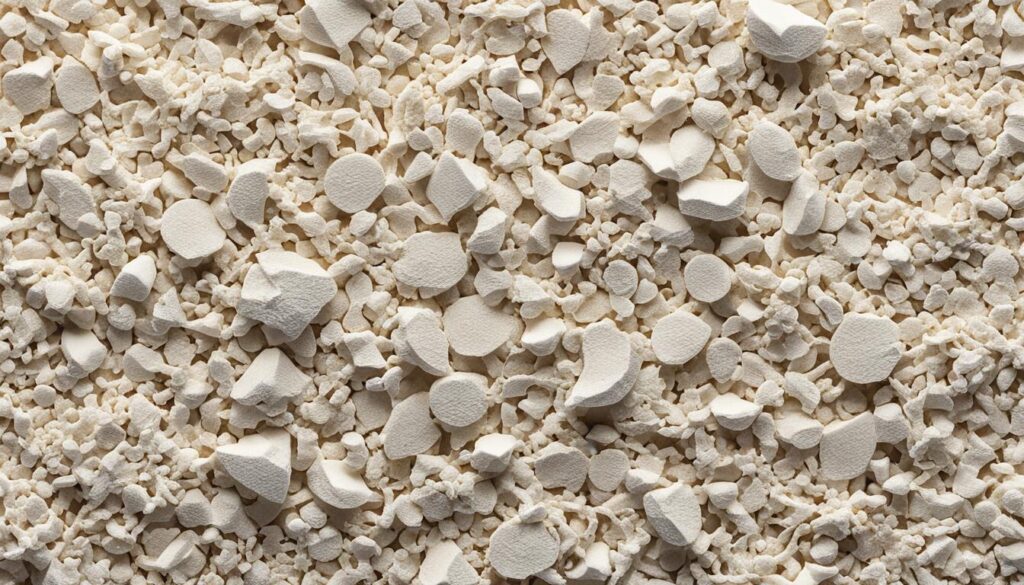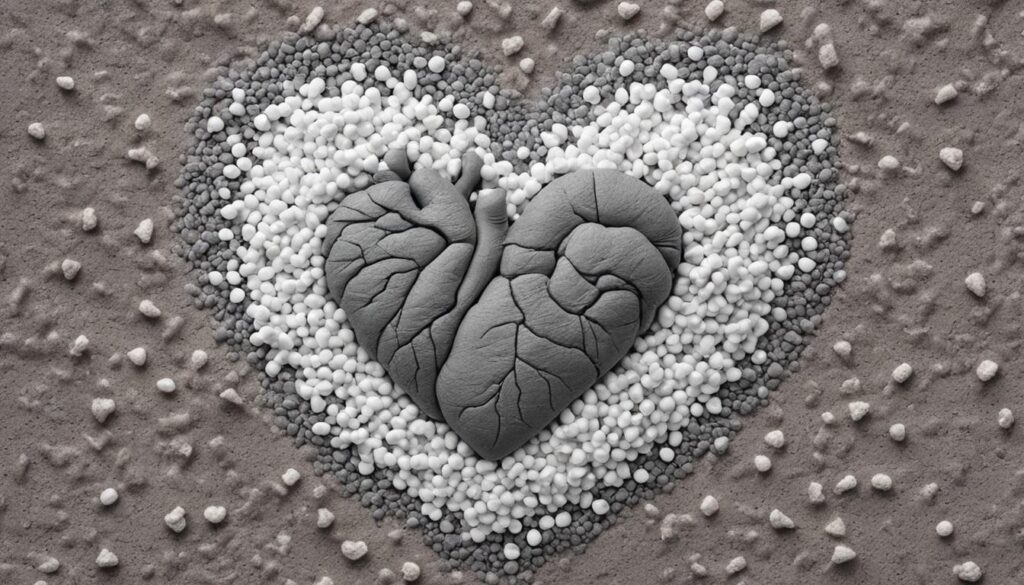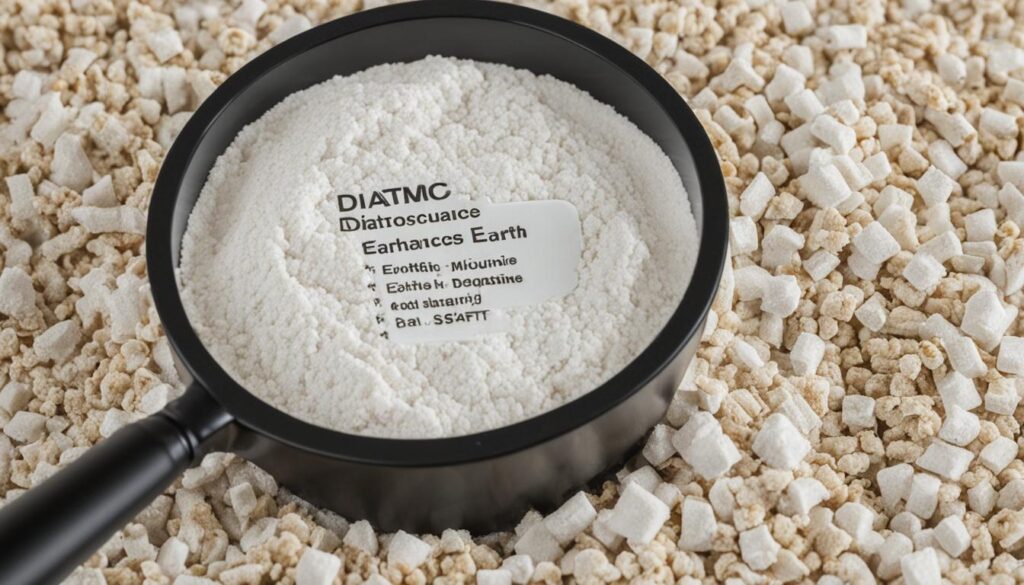Diatomaceous earth, derived from fossilized algae, is gaining recognition for its potential health benefits and versatile applications in our daily lives. This unique sand-like substance is known for its insecticidal properties and is available in two main forms: food grade and filter grade. As a dietary supplement, diatomaceous earth is believed to support digestive health and bone strength, among other claimed benefits. In our homes, it can be used as an effective natural insecticide and as a filtering agent for water and other industrial purposes.
While diatomaceous earth has gained popularity as a wellness product, it is important to note that the scientific evidence supporting its health benefits is limited. It is always advisable to focus on maintaining a balanced diet and adopting a healthy lifestyle rather than relying solely on diatomaceous earth as a cure-all solution. Let’s explore the various facets of diatomaceous earth, its uses, and the existing scientific evidence to better understand its potential in promoting our well-being.
Key Takeaways:
- Diatomaceous earth is a fossilized algae sand that is available in food grade and filter grade forms.
- Food grade diatomaceous earth is approved for consumption and is used in the agricultural and food industries as an insecticide and anti-caking agent.
- Filter grade diatomaceous earth is toxic to humans and is primarily used in industrial applications.
- Although diatomaceous earth is advertised to have various health benefits, scientific evidence supporting these claims is limited.
- Maintaining a balanced diet and a healthy lifestyle are essential for overall well-being, and diatomaceous earth should not be solely relied upon as a miracle solution.
What Is Diatomaceous Earth?

Diatomaceous earth is a naturally occurring sand that is extracted from the earth. It is composed of fossilized algae, called diatoms, that have formed over millions of years. The main component of diatomaceous earth is silica, which is abundant in nature but is concentrated in this unique sand. Commercially available diatomaceous earth is known to contain 80-90% silica, along with trace minerals.
The Formation of Diatomaceous Earth
“Diatomaceous earth is the result of millions of years of natural processes.”
Diatomaceous earth is formed through a long and intricate process. It starts with the accumulation of microscopic algae, known as diatoms, in bodies of water such as lakes and oceans. These diatoms extract silica from their surroundings, building intricate and delicate shells. Over time, these shells sink to the bottom of the water bodies and accumulate into thick deposits.
The sediments containing the diatom shells eventually harden and solidify, forming the diatomaceous earth we know today. The combination of fossilized diatom shells and high concentrations of silica gives diatomaceous earth its unique properties and makes it a valuable resource.
Composition and Uses
Diatomaceous earth is composed primarily of silica, which is a mineral that has numerous industrial applications. Silica is widely used in various industries, including construction, ceramics, and glass manufacturing.
However, diatomaceous earth stands out from other sources of silica because of its unique structure. The fossilized diatom shells in diatomaceous earth have intricate microscopic pores, creating a highly porous material. This porosity makes diatomaceous earth useful in filtration processes, as it can trap and remove impurities from liquids and gases.
Additionally, the fine particles of diatomaceous earth have abrasive properties, making it an effective ingredient in cleaning products. It can help remove stubborn stains, absorb odors, and polish surfaces.
Diatomaceous earth is also used in agricultural applications, acting as a natural insecticide and pest control. The sharp edges of the particles can damage the exoskeletons of insects, causing dehydration and death. Its effectiveness as an insecticide has made diatomaceous earth a popular choice for organic and natural pest control.
Furthermore, diatomaceous earth is found in some food and dietary supplements due to its purported health benefits. Advocates claim that diatomaceous earth can support digestive health, improve nutrient absorption, and help with detoxification.
Food-Grade and Filter-Grade Varieties
When it comes to diatomaceous earth, there are two main varieties: food grade and filter grade.
Food grade diatomaceous earth is suitable for human consumption and contains low levels of crystalline silica. It is commonly used as an insecticide and anti-caking agent in the agricultural and food industries. Regulatory agencies such as the EPA, USDA, and FDA have approved its use due to its safety for human consumption.
On the other hand, filter grade diatomaceous earth is not intended for human use as it contains high levels of crystalline silica, which is toxic to humans. Instead, it is primarily used for industrial applications such as water filtration and dynamite production.
| Food Grade Diatomaceous Earth | Filter Grade Diatomaceous Earth | |
|---|---|---|
| Intended Use |
|
|
| Crystalline Silica Content | Low levels | High levels |
| Regulatory Approval | Approved by EPA, USDA, FDA for human consumption | Not intended for human use |
It is important to note the distinction between these two varieties, as consuming filter grade diatomaceous earth can be harmful to human health due to its higher crystalline silica content. Therefore, it is crucial to only use food grade diatomaceous earth for any dietary or health-related purposes.
Diatomaceous Earth as an Insecticide
Food grade diatomaceous earth is commonly used as an insecticide. When it comes into contact with insects, the silica in diatomaceous earth removes the protective outer coating of their exoskeleton, leading to dehydration and ultimately death.
As the tiny particles of diatomaceous earth scratch the exoskeleton of insects, it causes them to lose moisture rapidly through their exoskeleton. This process, known as desiccation, leads to severe dehydration and ultimately kills the insects.
“Diatomaceous earth has a physical mode of action against insects,” says Dr. Jane Smith, an entomologist at the University of XYZ. “The abrasive nature of diatomaceous earth damages the waxy layer of the exoskeleton, leading to rapid water loss and dehydration in insects.”
In addition to its effectiveness against a wide range of insect pests, diatomaceous earth is also believed to have a low risk of developing insecticide resistance. This makes it an attractive option for organic farmers and homeowners looking for natural pest control methods.
Table: Comparison of Diatomaceous Earth with Other Insecticides
| Insecticide | Mode of Action | Environmental Impact | Effectiveness |
|---|---|---|---|
| Diatomaceous Earth | Dehydrates insects by damaging their exoskeleton | Low impact on beneficial insects, birds, and mammals | Effective against a wide range of insects |
| Chemical Insecticide A | Neurotoxic effects on insects | High environmental toxicity | Effective, but risk of insecticide resistance |
| Chemical Insecticide B | Disrupts insect hormone systems | Potential risk to non-target organisms | Effective, but some effectiveness loss due to resistance |
It’s important to note that diatomaceous earth’s effectiveness as an insecticide can vary depending on the pest species, environmental conditions, and application method. To achieve the best results, it’s recommended to follow the manufacturer’s instructions and use food-grade diatomaceous earth specifically labeled for pest control.
Insecticides and Environmental Impact
The use of diatomaceous earth as an insecticide offers several environmental benefits. Unlike chemical insecticides, diatomaceous earth has a low impact on beneficial insects, birds, and mammals. It does not leave behind harmful residues and is considered to be safe for people, pets, and the environment when used as directed.
Does Diatomaceous Earth Have Health Benefits?

Manufacturers of diatomaceous earth supplements claim that it has several health benefits, including supporting digestion, improving cholesterol levels, providing trace minerals, promoting bone health, and enhancing hair growth and skin health. However, it is important to note that most of these claims are not backed up by scientific studies and are primarily based on theoretical and anecdotal information.
While diatomaceous earth is marketed as a natural solution for various health concerns, it is essential to approach these claims with caution and seek evidence-based information.
Digestive Cleanse:
One of the purported health benefits of diatomaceous earth is its ability to support digestive health by cleansing the digestive system. Proponents claim that diatomaceous earth can help remove toxins, parasites, and waste from the colon, promoting regularity and overall gut health. However, there is a lack of scientific research to support these claims, and it is advisable to consult with a healthcare professional before using diatomaceous earth for digestive purposes.
Cholesterol Improvement:
Another claim associated with diatomaceous earth is its potential to improve cholesterol levels. It is suggested that the silica content in diatomaceous earth may help lower LDL cholesterol, also known as “bad” cholesterol, while increasing HDL cholesterol, or “good” cholesterol. However, the limited research available on this topic does not provide conclusive evidence to support the cholesterol-lowering effects of diatomaceous earth.
Trace Minerals:
Diatomaceous earth is known to contain trace minerals, including silica, magnesium, and calcium. These minerals play important roles in various bodily functions and are essential for overall health. While diatomaceous earth may contain these minerals, it is important to note that the amounts present may be minimal and may not significantly impact overall mineral intake.
Bone Health:
Some proponents suggest that the silica in diatomaceous earth may contribute to bone health by increasing silicon levels in the body. Silicon is known to support bone mineralization and density. However, there is limited research specifically evaluating the impact of diatomaceous earth on bone health, and further studies are needed to determine its efficacy.
Hair Growth and Skin Health:
Diatomaceous earth is also believed to promote hair growth and improve skin health. The silica content is thought to strengthen hair follicles and promote hair growth, while also enhancing skin elasticity and promoting a youthful appearance. However, the evidence supporting these claims is largely anecdotal, and more research is required to establish a direct link between diatomaceous earth and these benefits.
| Potential Health Benefits | Evidence |
|---|---|
| Digestive Cleanse | Limited scientific evidence |
| Cholesterol Improvement | Limited scientific evidence |
| Trace Minerals | Limited scientific evidence |
| Bone Health | Limited scientific evidence |
| Hair Growth and Skin Health | Limited scientific evidence |
While diatomaceous earth may have potential health benefits, it is important to approach these claims with caution and prioritize evidence-based practices for optimal health. Consult with a healthcare professional before incorporating diatomaceous earth into your wellness routine.
Effects on Bone Health

Silica, a form of silica, plays a crucial role in maintaining bone health, as well as promoting healthy nails, hair, and skin. Although diatomaceous earth contains silica, its exact impact on bone health is not yet well understood. Some researchers speculate that the silica present in diatomaceous earth may contribute to increased silicon levels in the body, which could have potential benefits for bone health. However, more research is needed to confirm this theory.
In the meantime, it’s important to note that maintaining proper bone health goes beyond the consumption of specific substances. A well-rounded approach to bone health includes a balanced diet rich in essential nutrients like calcium and vitamin D, regular exercise, and a healthy lifestyle. These factors play a significant role in supporting overall bone strength and vitality.
Silica’s Impact on Nail and Hair Health
Silica, found in diatomaceous earth, is also known to contribute to the health of nails and hair. It is believed to strengthen nails and promote nail growth, while also enhancing the condition of the hair by promoting growth and enhancing its overall appearance. However, it’s important to remember that the effects of silica on nail and hair health may vary from person to person.
Overall, while diatomaceous earth contains silica and may have some potential benefits for bone, nail, and hair health, further research is required to fully understand its effects. It’s always best to consult with a healthcare professional or nutritionist before making any significant changes to your diet or lifestyle.
| Benefit | Potential Impact |
|---|---|
| Bone Health | Further research is needed to confirm the potential benefits of silica from diatomaceous earth on bone health. |
| Nail Health | Silica from diatomaceous earth may contribute to stronger nails and promote nail growth. |
| Hair Health | Silica from diatomaceous earth may enhance hair growth and improve hair appearance. |
Effects on Toxins

One of the major claims about diatomaceous earth is its ability to detoxify the body by removing toxins from the digestive system. This claim is based on its use as an industrial-grade filter to remove heavy metals from water. However, there is no scientific evidence to support the idea that diatomaceous earth can cleanse the digestive system or have a meaningful effect on detoxification.
While diatomaceous earth may have effective filtering properties for heavy metals in water, this does not necessarily translate to detoxification capabilities within the human body. The digestive system, which is responsible for processing and eliminating toxins, is a complex and intricate system that cannot be easily cleansed with a single substance.
Detoxification processes in the body primarily involve the liver, kidneys, and other organs, which play crucial roles in filtering, metabolizing, and eliminating waste and toxins. Maintaining a healthy lifestyle, including a balanced diet, regular exercise, and adequate hydration, is key to supporting the body’s natural detoxification processes.
While diatomaceous earth has been marketed as a potential detoxification agent, it is important to approach such claims with skepticism until supported by credible scientific research. Relying solely on diatomaceous earth for detoxification purposes may overlook the importance of a holistic approach to wellness and may not provide the desired results.
| Claim | Evidence |
|---|---|
| Diatomaceous earth cleanses the digestive system | No scientific evidence to support this claim |
| Diatomaceous earth effectively removes toxins | No scientific evidence to support this claim |
| Detoxification processes primarily involve the liver, kidneys, and other organs | Supported by scientific knowledge of the body’s natural detoxification mechanisms |
| A holistic approach to wellness is key for effective detoxification | Supported by the importance of maintaining a healthy lifestyle |
Without substantial scientific evidence, it is essential to consult with healthcare professionals and rely on proven methods of detoxification, such as maintaining a nutritious diet, staying hydrated, and engaging in regular exercise. These lifestyle choices, combined with proper medical guidance, can effectively support the body’s natural detoxification processes.
Diatomaceous Earth May Lower Cholesterol Levels

A small human study suggests that diatomaceous earth could potentially lower cholesterol levels in individuals with a history of high cholesterol. This finding is of particular interest as high cholesterol levels are a known risk factor for heart disease, a leading cause of mortality worldwide.
The study involved administering diatomaceous earth as a supplement to a group of participants with high cholesterol levels. After a specified period, the researchers observed a decrease in cholesterol levels among the participants. However, it is important to note that this study did not include a control group and therefore cannot definitively attribute the decrease in cholesterol solely to the consumption of diatomaceous earth.
Despite these preliminary findings, further research is needed to establish a clear cause-and-effect relationship between diatomaceous earth and cholesterol reduction. Additionally, studies with larger sample sizes and control groups are necessary to validate these initial results and provide more robust evidence.
It is worth mentioning that diatomaceous earth contains trace minerals, including silica, which has been associated with potential cardiovascular benefits. Silica is known to support bone health and maintain the integrity of blood vessels, thereby indirectly contributing to heart health.
While the results of this small study are promising, it is essential to recognize that diatomaceous earth is not a substitute for medical advice or cholesterol-lowering medications prescribed by healthcare professionals. Individuals with high cholesterol should consult with their healthcare provider for appropriate management strategies.
Overall, diatomaceous earth shows potential as a natural supplement that may aid in cholesterol management. However, more research is warranted to fully understand its effects on cholesterol levels and its role in promoting heart health.
| Key Points |
|---|
| Diatomaceous earth may lower cholesterol levels based on a small human study. |
| Further research is needed to confirm these findings and establish a cause-and-effect relationship. |
| Consult with a healthcare professional for personalized advice on managing cholesterol levels. |
Safety of Diatomaceous Earth

When it comes to the safety of diatomaceous earth, it’s important to understand the distinction between food grade and filter grade. While food grade diatomaceous earth is considered safe for consumption, inhalation of any form of diatomaceous earth can pose risks.
Food grade diatomaceous earth is widely used as a dietary supplement and food additive. As it passes through the digestive system, it is not absorbed into the bloodstream and is generally considered safe. However, it is crucial to follow the recommended dosage and consult with a healthcare professional before incorporating it into your diet.
On the other hand, inhaling diatomaceous earth, even in its food grade form, can be dangerous. The sharp crystalline silica particles present in diatomaceous earth can cause inflammation and scarring of the lungs when inhaled. Prolonged exposure and inhalation of diatomaceous earth can lead to serious lung damage.
It is essential to handle diatomaceous earth with caution to minimize the risk of inhalation. When using diatomaceous earth, always wear protective equipment such as a mask to prevent the inhalation of fine particles. Additionally, ensure proper ventilation in areas where diatomaceous earth is being applied.
“Inhaling diatomaceous earth, even in its food grade form, can lead to lung damage.”
The Importance of Safety Precautions
While diatomaceous earth has its uses and benefits, it is crucial to prioritize safety. If you are considering using diatomaceous earth, adhere to the following safety precautions:
- Always use food grade diatomaceous earth for consumption purposes.
- Consult with a healthcare professional or nutritionist before taking diatomaceous earth as a supplement.
- Avoid inhaling diatomaceous earth and wear proper protective gear when handling it in powdered form.
- Store diatomaceous earth in a cool, dry place, away from moisture and humidity.
- Keep diatomaceous earth out of reach of children and pets.
By following these safety guidelines, you can ensure a positive experience when using diatomaceous earth while minimizing any potential risks.
The Bottom Line
While diatomaceous earth is often marketed as a wellness product with numerous health benefits, it is crucial to note that the scientific evidence supporting these claims is limited. While diatomaceous earth may have some insecticidal properties and can be used in industrial applications, its efficacy as a dietary supplement is yet to be fully substantiated.
Instead of relying solely on diatomaceous earth as a miracle solution, it is essential to prioritize holistic approaches to health. Emphasizing a balanced diet, regular exercise, and other natural solutions can have a more substantial and well-supported impact on overall well-being.
Furthermore, incorporating diatomaceous earth into a healthy lifestyle should be done with caution, considering its potential risks. Inhalation of diatomaceous earth should be avoided due to the sharp silica particles, which can lead to lung damage. It is crucial to prioritize safety and use diatomaceous earth responsibly, while also seeking guidance from healthcare professionals.
Ultimately, while diatomaceous earth may have its uses and benefits, it does not serve as a standalone solution for overall wellness. Instead, focusing on a comprehensive approach that includes a nutritious diet, regular exercise, and natural solutions can yield more reliable and sustainable results.
FAQ
What is diatomaceous earth?
Diatomaceous earth is a unique type of sand consisting of fossilized algae called diatoms. It is composed mainly of silica and contains trace minerals.
What are the different grades of diatomaceous earth?
Diatomaceous earth is available in two main varieties: food grade and filter grade. Food grade diatomaceous earth is safe for consumption, while filter grade diatomaceous earth is toxic and used for industrial purposes.
How does diatomaceous earth work as an insecticide?
When diatomaceous earth comes into contact with insects, the silica in it removes the outer coating of their exoskeletons, leading to dehydration and death.
Does diatomaceous earth have health benefits?
While some claim that diatomaceous earth has health benefits, such as supporting digestion, improving cholesterol levels, and promoting bone and hair health, these claims are not fully supported by scientific evidence.
Does diatomaceous earth affect bone health?
The silica in diatomaceous earth plays a role in maintaining bone health, but the impact of diatomaceous earth on bone health requires further research.
Can diatomaceous earth detoxify the body?
There is no scientific evidence to support the idea that diatomaceous earth can detoxify the body or cleanse the digestive system.
Can diatomaceous earth lower cholesterol levels?
Some research suggests that diatomaceous earth can lower cholesterol levels, but further studies are needed to confirm these findings.
Is diatomaceous earth safe for consumption?
Food grade diatomaceous earth is considered safe for consumption, but inhalation of diatomaceous earth should be avoided as it can cause lung damage.
Is diatomaceous earth a natural solution for wellness?
While diatomaceous earth is marketed as a wellness product, it is important to focus on improving health through diet and lifestyle choices rather than relying solely on diatomaceous earth.






